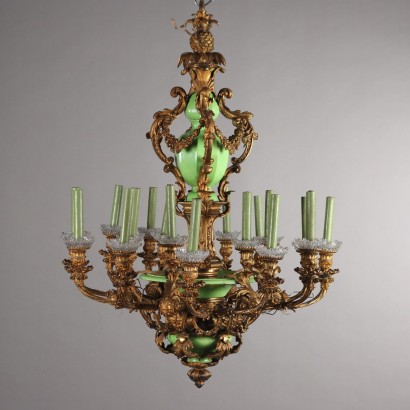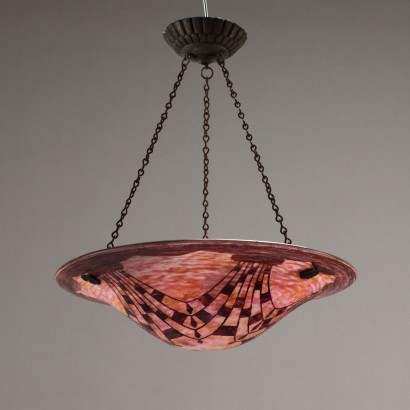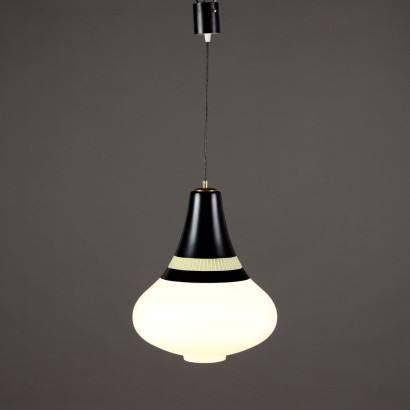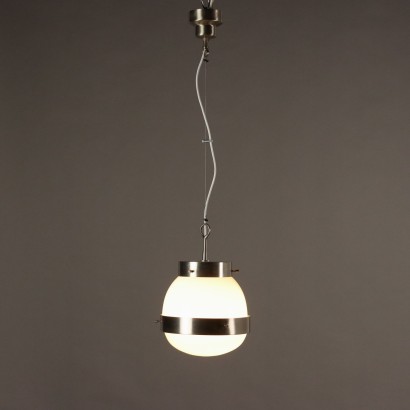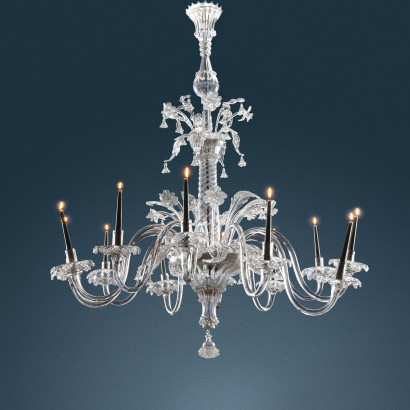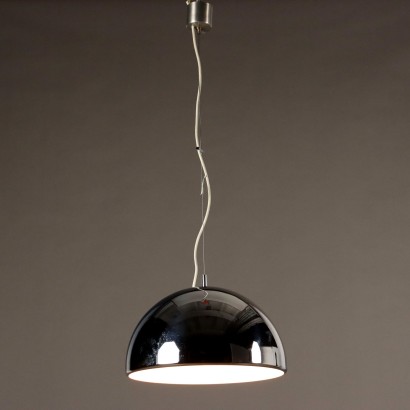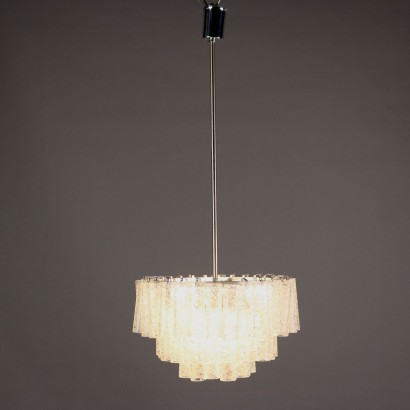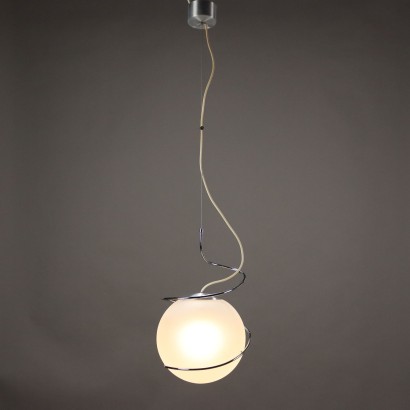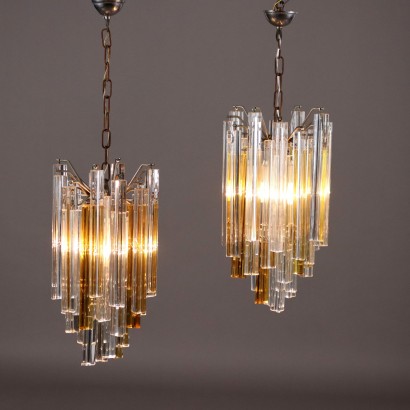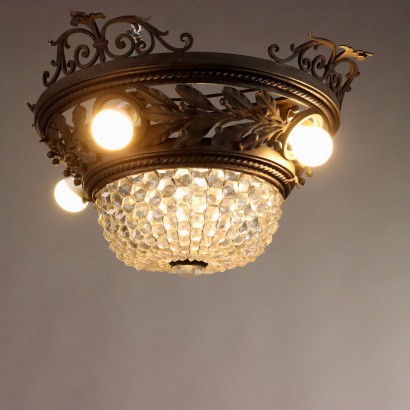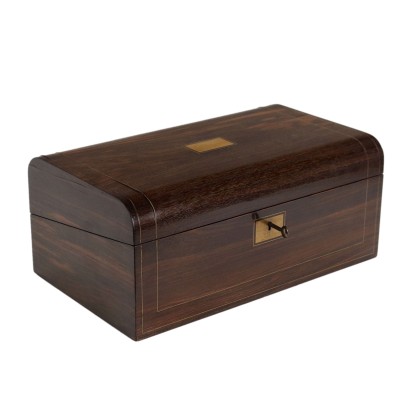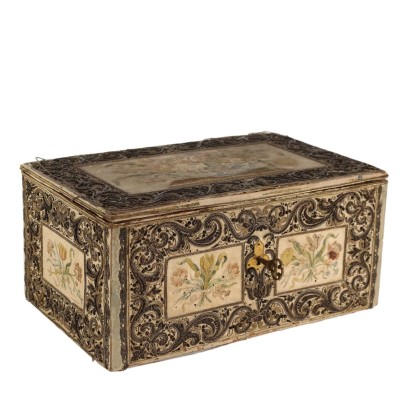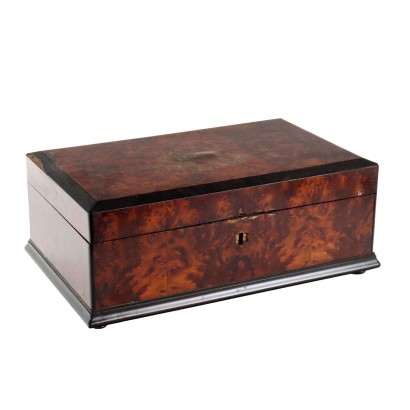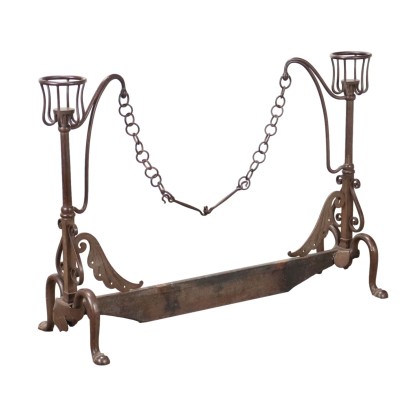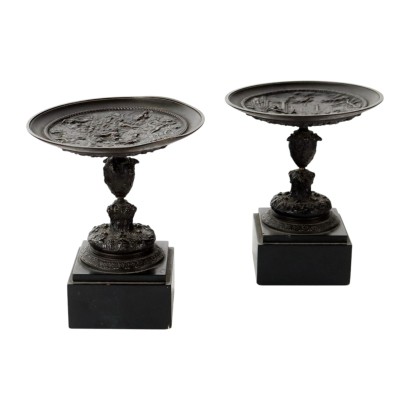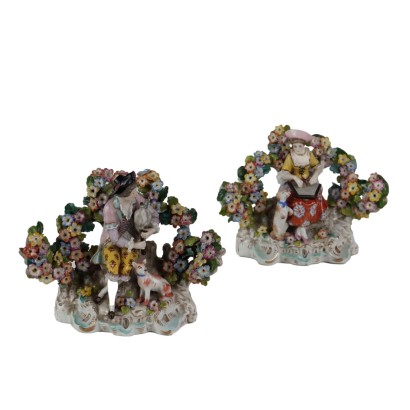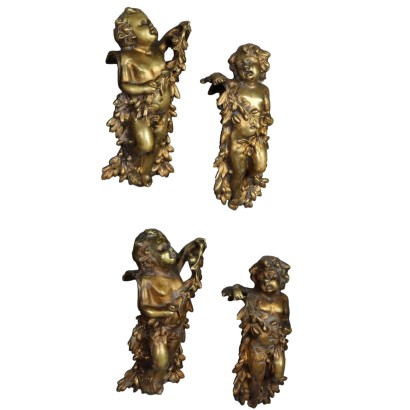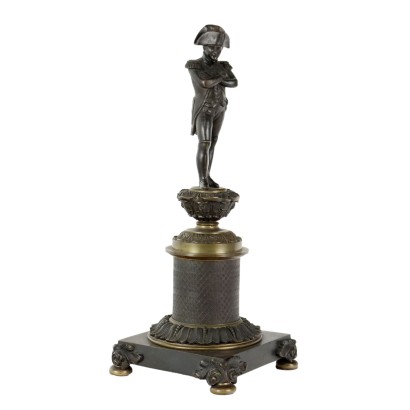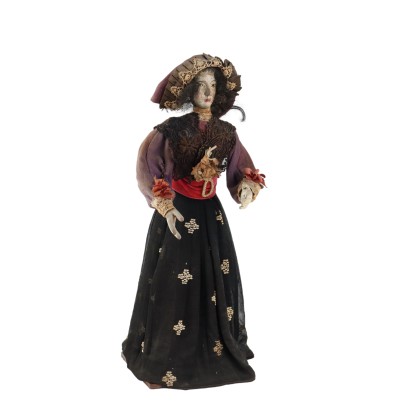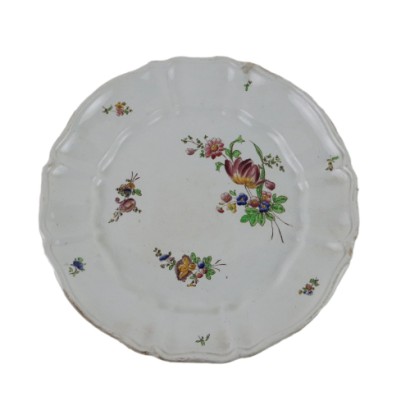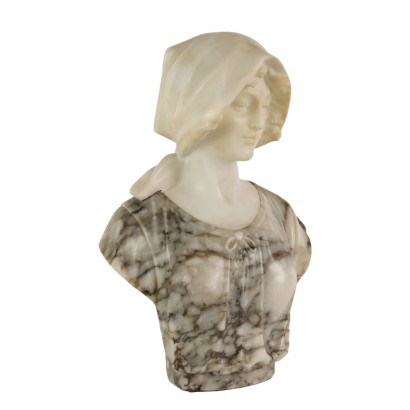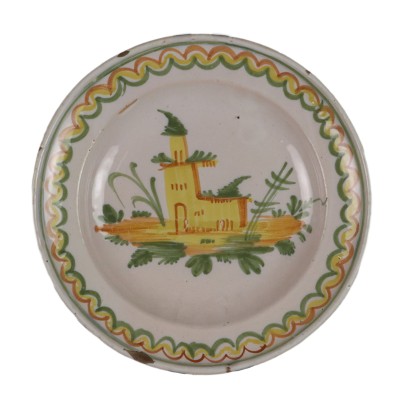Antique Chandelier Napoleon III Gilded Bronze XIX Century - France, Third Quarter XIX Century
Features
France, Third Quarter XIX Century
Style: Napoleon III (1848-1870)
Age: 19th Century / 1801 - 1900
Origin: France
Material: Gilded Bronze , Glazed Ceramic , Ground crystal
Description
Napoleon III chandelier with eighteen lights arranged in a double order, France, third quarter of the 19th century. Structure in gilded bronze, characterized in the central shaft by the presence of parts in green glazed ceramic; the golden bronze is characterized by the alternation of highlighted portions with opaque portions, thus creating reflections that amplify its brightness. On a decorative level, eclecticism dominates, finding both elements of clear rococo taste, particularly in the moving structure composed of curls, leafy volutes and ornamental motifs with a calligraphic character, and elements derived from the classical world, such as floral festoons, rosettes, capitals and masks. At the apex, placed on a bed of sloping leaves, a pineapple. Bobeches in cut crystal, one of which has been replaced and others are broken. It has defects in the gilding.
Product Condition:
Lamp which, due to age and wear, may require restoration work, and probably has an electrification system that is not adequate for current regulations. We try to present the real state of the lamp as completely as possible with photos. If some details are not clear from the photos, what is stated in the description applies.
Dimensions (cm):
Height: 103
Maximum size (cm):
Diameter: 73
Additional Information
Style: Napoleon III (1848-1870)
With Napoleon III as emperor, France experienced a period of extraordinary economic prosperity, a factor that allowed it to reconstitute a formidable war machine.In short, the dream that had once been Bonaparte's was revived: France as a great European hegemonic power.
The euphoria and grandeur also found perfect correspondence in the furnishings that characterized the Second Empire.
In Italy, the Napoleon III Style initially had insignificant effects, imposing furnishings in imitation of Louis XVI with an ornamental value resolved only in carving and completely devoid of bronze frills, in deference to a more sober taste that would always characterize Italian clients.
Only in the first decades of the twentieth century did "French" furniture find important commercial outlets in our country.
This is the name given to the artistic production of France under Napoleon III, president in 1848 and emperor from 1852 to 1870, the year of his abdication.
Rather than a style, we can speak of a set of styles, or rather revivals, given that in these years the eclectic tendency that had already appeared during the previous reign of Louis Philippe developed to its extreme consequences.
The drive to re-evaluate history and the Middle Ages also derives from the romantic spirit, as well as from the nationalistic one.
The houses were therefore furnished by mixing different styles and drawing from both the past and the East, with a tendency towards luxury and pomp that reflected the emperor's desire for grandeur.
In general, there was a return to the entire 18th century, with particular attention to Louis XVI; the fashion for dark woods (ebony and rosewood), exotic woods and bronze applications is confirmed.
From the 17th century onwards, the inlay created by André-Charles Boulle, the great cabinetmaker of Louis XIV, was revived. He created an inlay technique in gilded bronze and tortoiseshell, in which one of the two materials acts as a background for the perforated designs of the other.
Compared to the refinement of the original pieces, the "Boulle" furniture of this period is heavier and also flashier, given the addition of bright colours through painted sheets or parts in horn coloured blue, red or green.
Always in the wake of eclecticism, Venetian furniture arouses particular interest, which stimulates the production of polychrome and gilded furniture, in which figures of Moors often appear as supports.
These latter are also linked to the passion for the exotic that leads to the fashion for chinoiserie (in especially after the conquest of Beijing in 1860).
Discover more about the Napoleon III style with our insights:
a Napoleon III Secretaire to discover the cabinet with hiding places
A Napoleon III table to discover the caryatid
FineArt: Chandelier – O. Lelièvre & Susse Frères, Paris, last quarter of the 19th century
FineArt: Napoleon III Sideboard
The Austrian taste of Baroque
The Louis XV cabinet
The history of the writing desk
Napoleone III: the charm of the exotic in furniture
Age: 19th Century / 1801 - 1900
19th Century / 1801 - 1900Material:
Gilded Bronze
Glazed Ceramic
Ground crystal
Other customers have searched:
Approfondimenti
Scopri di più sui lampadari:Che cos'è il vetro opalino
Il lampadario Maria Teresa, un grande classico dell'illuminazione
Due epoche per un lampadario dal gusto unico
Lampadari Neoclassici Eleganti per Ricevimenti
Illuminazione by FineArt
Lampada '2259/2', Max Ingrand per FontanaArte
Lampadario barocco inizi XVIII secolo
Lampadario – O. Lelièvre & Susse Frères, Parigi, ultimo quarto XIX secolo
Lampadario Regency, Inghilterra, 1820 ca.
Lampadario anni '40 Manifattura Italiana
Lampadario Impero a Mongolfiera, primo quarto XIX secolo
Lampadario Inglese, prima metà XIX secolo
Lampadario 'Giogali', Angelo Mangiarotti per Vistosi
Biedermeier Reifenluster, Vienna, 1820-1830 ca.
Lampada da terra 'Prisma LTE12', Ignazio Gardella per Azucena
Lampada 'Pugnali' Piero Fornasetti
Lampada Magnolia di Sergio Mazza e Giuliana Gramigna per Quattrifolio
Sull'antiquariato in generale dai un'occhiata anche a:
Classic Monday: da un pezzo dei nostri magazzini alla storia dell'antiquariato
L'antiquariato dalla A alla Z: il Dizionario dell'Antiquariato
Il dizionario dell'antiquariato - Lastronatura
Il dizionario dell'antiquariato - Mascherone
Il dizionario dell'antiquariato - Natura morta
Il dizionario dell'antiquariato - Opificio
Il dizionario dell'antiquariato - Pastiglia
Il dizionario dell'antiquariato - Savonarola
Il dizionario dell'antiquariato - Rosone
Product availability
The product can be seen at Cambiago
Immediate availability
Ready for delivery within 2 working days from ordering the product.

